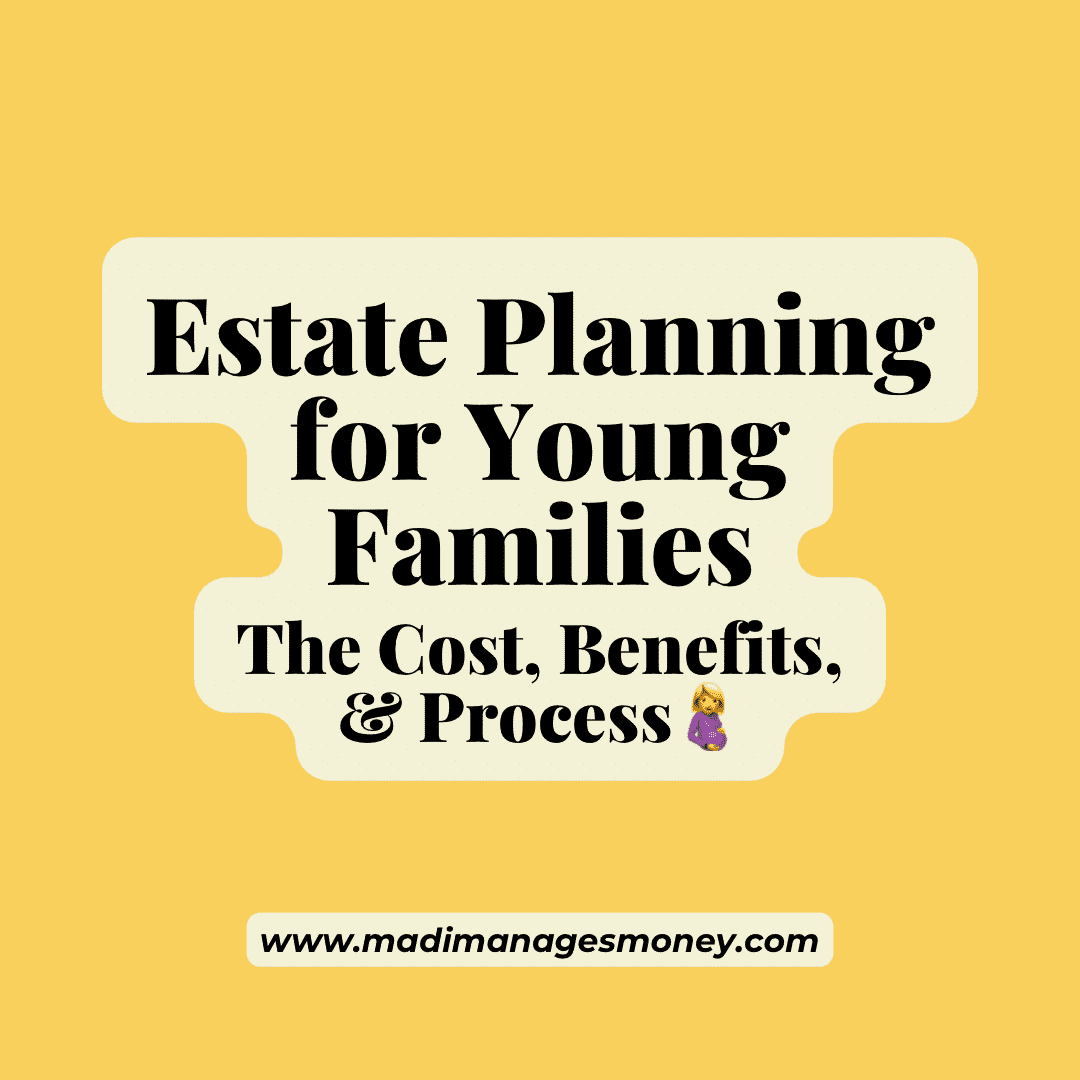Here’s what basic estate planning for young families entails & what it costs. Plus, I’ll share my experience creating ours with an attorney.
What comes to mind when you hear the term “estate planning?” For me, for whatever delusional reason, I envision an elderly matriarch (with a name like Eleanor) approaching the end of her life. Her attorney visits her timeless home – riddled with marble and mahogany and trinkets from long ago – to finalize bequests before her time comes. She memorializes her wishes in her will.
My default persona highlights two preconceived notions that I’d wager most of us have when it comes to estate planning:
- It’s for the wealthy.💰
- It’s for the elderly.👵
Combine these biases with the fact that estate planning requires thinking A LOT about your potentially premature death, and you can see why it so easily gets shuffled to the backburner.
A very unscientific survey on Instagram to which ~300 people responded corroborated this behavior. (Respondents were primarily women, ages 25 to 45.)
Have you done estate planning?
- Yes – 14%
- Not yet, but it’s on my to-do list – 69%
- Never considered it – 17%
If you’re a parent of young children, I’ll put it bluntly: you’re chancing it without an estate plan. You’re leaving major decisions, like who cares for your children and who receives your assets, up to someone else should you pass away.
The good news is estate planning for young families is more accessible than you’d think, as I’ll outline in this post. Here are the basics to help you get your own plan in motion.
What’s included in basic estate planning for young families?
Of course, estate planning involves creating a will, but it’s much more than that. At its core, a basic estate plan determines:
- What happens to your assets
- What trusts should be established
- Who cares for your minor children
- Who acts as executor of your estate
- Who your healthcare & financial powers of attorney are
Your Assets
Your will determines who gets what when you pass away, especially for assets that are not financial accounts. Bank or investment accounts, like IRAs or 401(k)s, are transferred based on the beneficiary you designate within the account, not according to your will. The same goes for life insurance proceeds.
(Take this as your sign to update your beneficiaries! Shit will hit the probate fan if you don’t have proper beneficiaries on your accounts and you pass away.)
Your assets that aren’t in financial accounts, like real estate, will transfer according to your will.
In my case, my husband is my primary beneficiary, whereas my daughter is my contingent beneficiary. Meaning, when I pass away, my assets go to him first. If both he and I would pass, she stands to inherit our assets.
Establishing Trusts
Two-year-olds are fabulously poor managers of millions of dollars in life insurance and investment account proceeds. As such, the courts don’t take kindly to naming them as a direct beneficiary to receive assets outright. Luckily, several options exist to establish a trust to prevent this problem.
You can think of a trust as a place for money to reside until your child is mature enough to handle it. Your estate planning attorney will guide you to the right configuration for your situation.
- Establish an UTMA/UGMA account at an online broker. This is the most cost-effective way to establish a trust for your kid, but it’s also the most cookie-cutter. The catch with an UTMA/UGMA is that at the age of majority in your state, which is usually 18 or 21, your child will gain full control of the account. No exceptions. No go-backsies. (Not sure about you, but I sure as hell wouldn’t have cut 21-year-old Madi loose with a million bucks.)
- Call for a “Contingent Trust” in your estate plan. An attorney can write into your estate plan for a trust to be established, depending on when you die. If you’d die while your children are still minors, the “Contingent Trust” is triggered into existence and becomes the place where you route things like insurance proceeds. This is the option we chose because of our net worth and the fact that we have a young family. Plus, we customized the age at which our daughter would control the account. We chose 28.
- Establish a trust now. Several different types of trusts exist that an attorney could explain and recommend. The purpose of one is to prevent assets from going through probate (which is expensive) or to reduce an estate tax burden. Unless you have (or stand to inherit) substantial assets, establishing a trust now is unlikely to be the approach recommended to you with a young family. Creating one is more expensive, and it’s cumbersome to retitle assets into a trust. Plus, you can always set one up later in life when you have more money.
Again, a trust is the ideal landing place for life insurance proceeds, not my daughter’s bank account. (Actually, little girlfriend doesn’t even have a bank account. She’s a straight, cold-blooded equities gal.)
Your attorney can provide you with verbiage to give to your insurance company to ensure all proceeds are routed into your trust, whatever type you choose.
On a related note, I’m generally not a huge UTMA/UGMA account fan when it comes to investing for children for the average family. I am, however, on-board with the concept of opening an UTMA/UGMA as a landing place for insurance proceeds. Just make sure you’re comfortable with your child controlling the account as early as age 18.
My daughter had an UTMA/UGMA primarily for this purpose, but now we’ll route insurance money to the “Contingent Trust” instead.
Custody of Minor Children
This is a biggie. If you pass away without formal instruction of who should take custody of your children, someone other than you may ultimately decide who will care for them. Plus, you can imagine how passing without clear direction, especially under tragic circumstances, would add even more stress to your family’s plate in your wake.
Yes, generally a close family member would end up with custody, but this isn’t a decision I’d want anyone making other than me. And no, naming someone as a godparent during a baptism doesn’t count as an estate plan. It has no legal bearing on who gets custody of your children.
In our will, we have clear directives for who is to care for our daughter and who will act as trustee of the “Contingent Trust.” These can be different people or the same.
Executor of Your Estate
The executor of your estate is like the quarterback of your estate plan after you pass. Their job is to settle your debts and distribute assets as you’ve laid out in your will.
Executorship is a tall ask. It’s likely you’d be the executor for your own spouse, and vice-versa, especially if you have a young family. As you age, logically, it becomes increasingly likely that another family member will be at least one of your executors.
You want to select someone who’s capable of…well, executing…and up to the task. It’s common for several people in the same family to name the same relative as executor. (I’m sure you realized who this person is in your family in about 2 seconds.)
Be mindful of how many times they could potentially go through this in their life.
Healthcare & Financial Powers of Attorney (POA)
A power of attorney is someone who can make formal decisions on your behalf. This can come in really handy if you’re incapacitated and unable to make choices for yourself.
My husband and I signed durable powers of attorney for healthcare, meaning they’ll stay in effect even if we’re rendered incompetent. We also created living wills, which outlines the end-of-life care we’d each want to receive.
We signed financial powers of attorney, which go into effect immediately. I’d only recommend giving someone this authority if you trust them the utmost. Your financial power of attorney could, in theory, sign to make financial decisions on your behalf immediately after you sign the documents.
We’re a young family who created an estate plan. It went like this…
Estate planning for our young family was much easier and accessible than I thought. A friend and former colleague referred me to an attorney in Pittsburgh. I shot the attorney an email, and we were off to the races.
- The attorney asked me to complete a questionnaire detailing our assets and liabilities (net worth). This helped the attorney gauge the level of complexity at hand. In our case, not much.
- The attorney explained clearly how fees work. There’d be a fee cap on the engagement of $1,500. If, for some reason, the amount of work required breached this level, we’d have another discussion.
- We had two phone calls over a 2-3 week period to draft and finalize our documents. On these calls, we reached decisions on the aforementioned components👆 of our plan. For every choice we made, I felt like the attorney clearly explained the implications.
- I had the opportunity to review the final drafts for a few days.
- We came into the office IRL to sign several copies of our documents.
Just like that, it was done!
We plan to keep the original version of our documents at the law firm’s office, where they will store it at no additional cost. This way, the instructions of where to find our directives will be to simply contact this firm.
The alternative was, “keep this key, go down in our basement, look under the steps for our dusty safe, hope it’s in the green folder.” The law firm feels like a better fail-safe.
Conclusion: Estate planning for young families is easier & more affordable than feared.
I guess because I had the notion that estate planning was primarily for the upper crust, I expected to pay up. In total, this took 5 hours of my time, and at most, $1,500 of my money.
Yeah, there are cheaper routes we could have taken, like online will and trust services that I’d then get notarized. In our case, the freedom to ask the attorney questions and feel confident in our choices was invaluable. Duct-taping a solution together on my own felt risky and not worth the potential savings.
Estate planning for young families hurts to think about, but the only thing that’s worse is the thought of leaving your family in a lurch with no plans made. Even still, I think for most of us it’s less a matter of avoidance and more so a lack of awareness.
Just like major life skills, like the basics of taxes or investing, weren’t taught in school, neither was estate planning. The fact that you’re even here reading about it means you’re already a step ahead of most!
Have you completed an estate plan? I’d love to hear from you. Or, if you’re in the Pittsburgh metro area and looking to build one for your family, I’m happy to refer you to the attorney we hired.
The opinions voiced in this material are for general information only and are not intended to provide specific advice or recommendations for any individual. To determine which investments may be appropriate for you, consult with your financial advisor.

